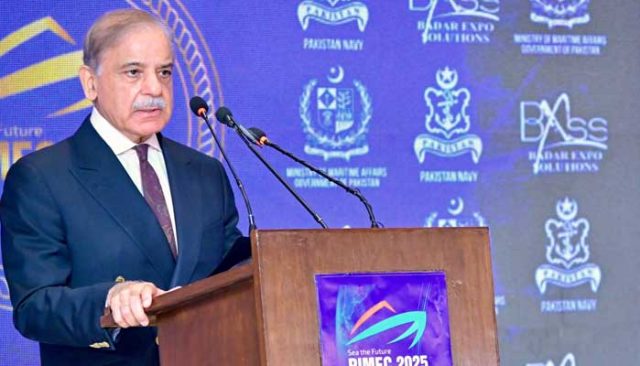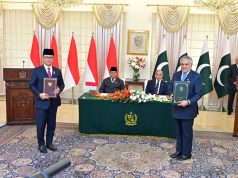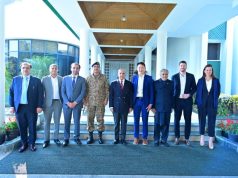ISLAMABAD, Monday, June 16, 2025 (WNP): Prime Minister Muhammad Shehbaz Sharif on Monday declared the blue economy as Pakistan’s “new economic frontier,” urging a unified national effort to harness its vast and largely untapped potential.
Speaking at the soft launch of the 2nd Pakistan International Maritime Expo and Conference (PIMEC 2025), the prime minister outlined a vision to transform Pakistan into a regional maritime powerhouse, capitalizing on its strategic location and abundant marine resources.
“It is a great pleasure to witness the Pakistan Navy, under the Ministry of Maritime Affairs and in collaboration with key partners, organizing this landmark event,” the prime minister said, commending Chief of Naval Staff Admiral Naveed Ashraf and Federal Minister for Maritime Affairs Muhammad Junaid Anwar Chaudhry for their leadership.
Highlighting the Navy’s pivotal role in national defense and regional maritime security, PM Shehbaz praised initiatives like the multinational AMAN exercise — involving over 50 countries — as symbols of Pakistan’s commitment to cooperative maritime diplomacy.
“With more than 1,000 kilometers of coastline and a location at the crossroads of critical sea lanes, Pakistan is uniquely positioned to capitalize on the trillion-dollar global blue economy,” he said. “Even tapping a fraction of this could transform our economic landscape.”
The prime minister emphasized the need for innovation, resilience, and strategic investment, urging inspiration from global examples such as Japan, which rose to maritime prominence despite limited natural resources. “Let there be open competition,” he said, calling for a robust public-private synergy to drive inclusive and sustainable maritime growth.
Federal Minister for Maritime Affairs Junaid Anwar Chaudhry laid out the government’s long-term strategy through the “Maritime at 100” Vision — an ambitious roadmap aiming to grow the sector into a $100 billion economic engine by 2047, Pakistan’s centennial year.
“PIMEC 2025 will be more than just an exhibition — it will be a platform for investment, innovation, and regional cooperation,” the minister said, as he outlined key sectoral drivers: an Rs88 billion fisheries industry, Gaddani Ship Recycling Yard with a recovery potential of over Rs30 billion, and Pakistan’s geo-economic advantage linking key trade routes.
He also announced the nearing completion of three major policy frameworks: the National Maritime Policy, National Shipping Policy, and National Fisheries and Aquaculture Policy — all designed to guide sustainable and innovation-led growth.
Key initiatives unveiled included:
- A Rs12 billion federal investment to revive the Gaddani Ship Recycling Yard
- Acquisition of four new ships for Pakistan National Shipping Corporation, raising the national fleet to 14 vessels
- Progress on Port Qasim’s dredging project
- Development of a multi-modal logistics corridor from Gwadar to enhance regional trade
- Creation of a Maritime Chamber of Commerce and Industry and a centralized Maritime Complaint Cell for improved governance and transparency
Minister Chaudhry also reaffirmed Pakistan’s candidacy for a seat on the International Maritime Organization Council (Category C) in the December 2025 elections and expressed optimism over international support.
Zohair Naseer, CEO of Badar Expo Solutions and co-organizer of PIMEC 2025, said the expo — to be held from November 3 to 6 at the Karachi Expo Centre — would host high-level maritime conferences, B2B networking sessions, and an international exhibition showcasing global maritime leadership and innovation.
Commodore Ahsan Ali Khan, Assistant Chief of Naval Staff, echoed the call to action by emphasizing the ocean’s vast potential in trade, energy, aquaculture, and natural resource extraction.
“The oceans are no longer just water bodies; they are strategic economic assets,” he said, citing Pakistan’s connectivity with Central Asia, Afghanistan, and western China through Karachi and Gwadar.
He described PIMEC as a vital milestone in realizing the country’s maritime ambitions, noting that projects like the China-Pakistan Economic Corridor (CPEC) embody Pakistan’s strategic commitment to unlocking its blue economy.




